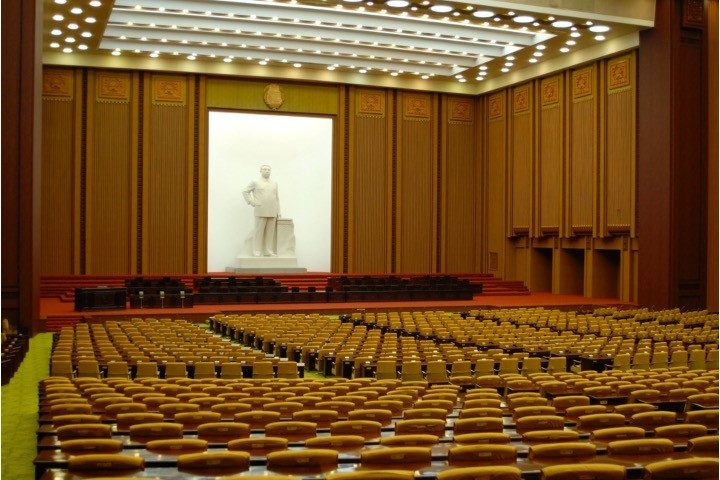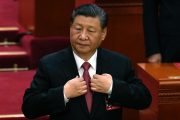
The North Korean Supreme People’s Assembly (SPA), the isolated country’s rubber-stamp Parliament, will gather on Jan. 17 to discuss the government budget and other issues, state media announced on Wednesday. This meeting is slated to be held amid rising economic difficulties that the rogue state is currently facing.
The North’s Parliament seldom gathers, and typically functions to assent to decisions on matters like budgets and governing methods that have already been set up by the state’s ruling Workers’ Party, members of which form the vast majority of the assembly.
The work of the Cabinet, government budgets, organizational matters, and “the law on the protection of the cultured Pyongyang dialect” will be included in the agenda of the meeting, according to KCNA news agency.
The January session would be after the plenary meeting of the ruling party’s central committee in late December, in which Pyongyang is slated to make key policy directions for the new year.
North Korean leader Kim Jong Un announced earlier that this year’s internal and external circumstances were “unprecedented adversity that tested our will and fighting efficiency,” but that the country attained “remarkable development” to increase its honor and prestige to a new level.
After enduring the largest slump in more than two decades the previous year, though, North Korea’s economy shrank in 2021 for a second straight year.
U.S. Calls for Increased Sanctions
This year, North Korea launched an unprecedented series of provocative missile tests, leading to sanctions from the United States, Japan, and South Korea.
The high volume of missile tests — and the impending possibility of a seventh nuclear test — has catalyzed calls for amendments to longstanding U.S. policy.
Washington has been ramping up pressure for more United Nations sanctions on the North due to fear that the latter may resume its nuclear-weapons testing. However, China and Russia have vetoed American efforts, arguing that sanctions should be loosened to facilitate talks and prevent humanitarian harm.
On Dec. 6, the Biden administration declared that the U.S. would not alter its longstanding North Korea policy and would continue concentrating on deterrence and stronger ties with Asian allies, according to a senior White House official.
The United States is “always examining our assumptions” about North Korea, but believes “the course that we’ve been on has been effective and prudent,” White House Indo-Pacific Coordinator Kurt Campbell told reporters.
“It’s undeniable that North Korea is one of the most challenging issues on the global stage,” he said on the sidelines of the Trans-Pacific Dialogue conference in Virginia hosted by South Korea’s Chey Institute for Advanced Studies. “Our best approach is to ensure that we are, in fact, in lockstep with our allies and partners, and we’re going to continue with that.”
In a confirmation of its commitment, the State Department announced on Tuesday that it had authorized the sale of 18 Boeing CH-47F Chinook helicopters, together with engines, radios and other parts, for South Korea, in a package valued at $1.5 billion.
The State Department assured that the deal would “improve the security of a major ally that is a force for political stability and economic progress in the Asia-Pacific region.”
Although some experts have urged for increasing sanctions or pressuring China, North Korea has been “incredibly sophisticated at avoiding sanctions” imposed by the U.S. and her allies, observed Joel Wit, a former senior State Department official who negotiated with North Korea in the 1990s and is now a distinguished fellow at the Stimson Centre, a nonpartisan think tank. “If you look at the history of this issue, the U.S. periodically issues these sanctions, and they have no effect — the North Koreans don’t care.”
Wit said the sanctions have failed partly due to the economic support Pyongyang receives from China. Yet the U.S. does not have the will to alter its China policy, for fear of undermining its relations with Beijing.
“Really ramping up sanctions means going at China — hard — because a lot of what happens economically in North Korea is related to China. So are we going to do that now, with China, just to get to North Korea? I don’t think so.”
A “Socialist Fairyland”
In September, North Korea’s Parliament convened to pass legislation aimed at turning the country into a “beautiful and civilized socialist fairyland,” state media reported. The North Korean Supreme People’s Assembly (SPA) passed laws on landscaping and rural development, state news agency KCNA reported.
The two laws will facilitate the ruling party’s attempts to ensure “a radical turn in the rural community and its policy on landscaping to achieve a rapid development of the Korean-style socialist rural community and spruce up the country into a beautiful and civilized socialist fairyland,” KCNA said, citing a deputy’s speech to the gathering.
While Kim was not at the September session, he has pledged to enhance people’s livelihoods and bolster rural development amid rising economic crises due to self-imposed Covid-19 lockdowns, international sanctions over the country’s nuclear weapons program, and natural disasters.
However, several of Kim’s economic promises have not come to fruition, analysts say, and aid organizations have cautioned against massive food shortages and other hardships.
Based on an earlier report by 38 North, a U.S.-based site that covers North Korean issues, Kim’s efforts to rebuild a typhoon-ravaged province in the country’s North and convert it into a “model” mining community have not seen much progress. The U.S. has accused him of channeling resources into his military projects while sacrificing the well-being of his country’s people.



